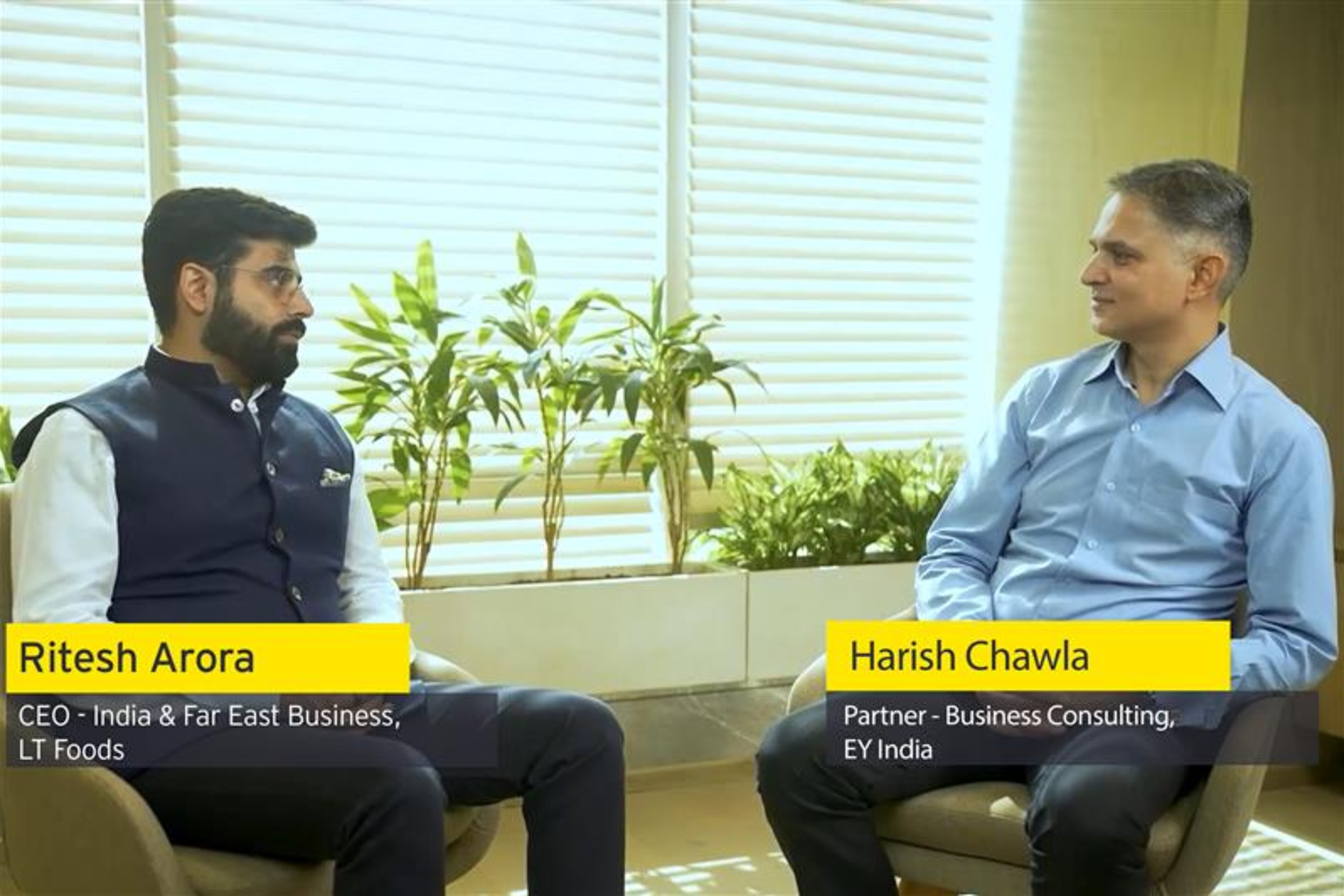EY refers to the global organization, and may refer to one or more, of the member firms of Ernst & Young Global Limited, each of which is a separate legal entity. Ernst & Young Global Limited, a UK company limited by guarantee, does not provide services to clients.
Committed to achieving net zero carbon emissions by 2045, the company is boosting operations productivity through sustainability-led business transformation.
At Dabur, sustainability has grown from a commitment to becoming the foundation and core DNA of the company’s business model. By embedding environmental, social and governance (ESG) principles into its strategy, the company has transformed into a sustainability-led business operations with impressive outcomes in productivity while becoming an industry frontrunner in ESG targets. In fact, the company is now on its transition path to achieving net zero carbon emission status 25 years before the 2070 national target. Dabur’s journey, however, is shaped by hard work, persistence and deft navigation through change management and people challenges.
Dabur is working to create an organization that is future-fit, which requires conversations at the leadership and board levels. It is essential to align all stakeholders, including board members, and drive the journey forward.
Embracing sustainability has not been without challenges for Dabur. One pressing issue is the risk of treating sustainability as a siloed initiative rather than embedding it across all business functions. Equally challenging is the task of extending ESG practices beyond internal operations to external value chain ecosystem who often operate in diverse ecosystems. Resistance to change posed another significant hurdle, while the lack of reliable data for decision-making created a substantial barrier.
In response, Dabur developed a robust four-pronged ESG strategy to address these obstacles. This ambitious approach required organization-wide alignment and collaboration to seamlessly integrate sustainability into operations and the value chain. Here is how Dabur tackled these challenges, balancing multiple business drivers.
ESG commitment: embedding sustainability across dimensions: Beginning with an acute awareness of its environmental footprint, the company has set ambitious goals, such as becoming water positive by 2030, an imperative for a juice business where 20% of operations rely on water-intensive processes. Recognizing the profound effects of climate change, Dabur addresses challenges like extreme weather and shifting seasonal patterns that impact product demand, such as Chyawanprash sales during shorter winters.
On the social front, the company fosters diversity and inclusion, with initiatives like an all-women-operated manufacturing line achieving a 20-30% boost in productivity, exemplifying the tangible benefits of gender diversity. These efforts are underpinned by governance excellence, ensuring that environmental and social initiatives are effectively implemented, monitored and continuously refined to drive long-term impact.
Climate risk assessment: adapting to change: Understanding and mitigating climate-related risks is critical to ensuring Dabur’s business sustainability. The company faces diverse challenges, including unpredictable rainfall patterns and extreme weather events such as floods in Gujarat and Telangana, which disrupt supply chains, alter consumption patterns and impact profitability. To address these risks, Dabur has developed a comprehensive climate risk management framework, which monitors identified risks that are then presented to the board, investors and analysts. This transparent approach enables proactive planning and effective mitigation strategies, safeguarding the company’s resilience against climate-related disruptions.
Ambitious ESG goals: driving positive change: Dabur has set ambitious targets to align with and contribute to India’s sustainability ambitions. Committed to achieving net zero carbon emissions by 2045, well ahead of India’s national target of 2070, Dabur positions itself as a frontrunner in environmental responsibility. The company also aims to achieve water positivity by 2030, replenishing more water than it consumes, reflecting its commitment as a resource-intensive business. Furthermore, Dabur has established bold diversity milestones, emphasizing gender diversity as a key driver of productivity and innovation, underscoring its holistic approach to sustainable growth.
Strengthening governance: ensuring accountability: Dabur has a robust multi-tiered governance framework to drive effective implementation and sustained progress of its ESG strategy. At the core is the Executive Committee, responsible for the day-to-day execution of ESG initiatives. Overseeing these efforts is the Management Committee, which monitors progress and ensures alignment with the company’s strategic objectives. At the highest level, the Board-Level ESG Committee, comprising independent directors, provides oversight to maintain neutrality and accountability. Together, these governance mechanisms foster transparency, drive accountability and enable the seamless execution of Dabur’s ESG goals.
Dabur is integrating sustainability and climate change into all the processes within the organization, rather than treating sustainability as a siloed process.
Nitesh Mehrotra
Partner, Sustainability and ESG, EY India
ESG at Dabur: balancing ambition, execution and sustainability
Dabur’s four-pronged ESG approach exemplifies its commitment to aligning business imperatives with global sustainability trends, positioning itself as a responsible industry leader. At the heart of Dabur’s ESG strategy is its integration at the board level, where balancing short-term profitability with long-term sustainability goals presents unique challenges. For instance, initiatives like net zero commitments, plastic waste neutrality and biodiversity conservation require upfront investments that may not yield immediate returns.
As a publicly listed company, Dabur faces the added pressure of quarterly financial performance expectations, requiring careful navigation of these tradeoffs. Through board alignment and stakeholder engagement, Dabur has successfully emphasized the strategic importance of sustainability, fostering a forward-thinking, resilient organization. Engaging investors and analysts on the long-term benefits of ESG investments has further bridged the gap between external expectations and internal vision.
Setting ambitious ESG goals is only part of the equation, effective execution is equally critical. Dabur collaborates with experts like EY to for leading practices and sector intelligence, ensuring delivery on its commitments enabled by digital and data. Balancing premiumization with accessibility has been another cornerstone of Dabur’s strategy. Transitioning to sustainable materials, such as recyclable plastics, often increases costs. While premium product lines cater to urban consumers willing to pay for eco-friendly solutions, Dabur is gradually integrating these practices into its mass-market offerings to maintain affordability in price-sensitive rural markets.
Dabur’s ESG journey is as much about setting a precedent as it is about achieving targets. Each milestone, from achieving plastic neutrality to launching sustainable products, builds momentum toward a future where sustainability is seamlessly integrated into core business strategies. While significant progress has been made, Dabur recognizes the challenges ahead, requiring perseverance, innovation, and collaboration across internal teams, external partners and consumers. Dabur is paving the way for a future where economic growth and environmental responsibility go hand in hand.
Summary
Dabur is embedding sustainability into its business model through a comprehensive environmental, social and governance (ESG) framework. With a robust four-pronged strategy, the company has set ambitious goals, including achieving net zero carbon emissions by 2045 — 25 years ahead of India’s national target — and attaining water positivity by 2030. Dabur integrates sustainability across all functions while tackling climate risks, enhancing diversity and fostering strong governance. Through effective alignment of short-term profitability with long-term goals and active stakeholder engagement, Dabur showcases the transformative potential of ESG to drive resilience, innovation and industry leadership.
How EY can help
-
Sustainability services and solutions by EY India guide ESG strategy, climate action and reporting and decarbonization backed with data and technology.
Read more -
EY ESG & sustainability services help organizations address investor concerns, enhance ESG reporting and performance with long-term sustainable strategies.
Read more -
Streamline ESG reporting with EY’s ESG Compass. Explore ESG solutions, tools, dashboards, and fact sheets to enhance sustainability and compliance.
Read more
Explore our case studies
How LT Foods achieved 2x revenue growth with digital supply chain transformation
LT Foods elevates supply chain transformation and doubles revenue with EY's Asterisk platform, enhancing agility and service in the food market.
How a manufacturer eliminates cost and value leakages with AI-ML
Discover how EY AI-enabled tool helps a roofing solutions manufacturer improve production efficiency while maintaining quality standards. Learn more about AI in manufacturing use case.
How a young cement company grew 2.5x with organizational and functional transformation
Learn how EY helped a young cement manufacturer grew production capacity by 2.5x facilitated by data-driven transformation.







